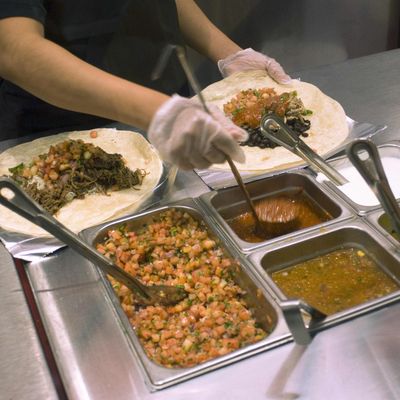
Imagine what would happen if a celebrity or the head of a major company took a proud public stance that ran contrary to the overwhelming consensus of the world’s major health and science organizations. We know the answer because this happens all the time: When Jenny McCarthy argues that there’s a link between vaccination and autism, or a politician says he thinks anthropogenic global warming is a scam perpetrated by greedy climatologists, they are swiftly pilloried in most mainstream venues.
In the most extreme cases, pronouncements that clash with the scientific consensus are met with angry Facebook posts and petitions and all the other accouterments of circa-2015 internet outrage. The questions are screamed in unison: How can these people ignore science? And how can they be so irresponsible as to encourage others to do the same?
And yet when the burrito giant Chipotle announced earlier this week that it will no longer be using any ingredients that contain or originate from genetically modified organisms, or GMOs, there was barely a peep from the usual guardians of empiricism — despite the fact that more than 16 major international science organizations, including the American Medical Association and the National Academy of Sciences, have concluded that there is no good reason to avoid consuming current GMOs. The burrito purveyor hasn’t suffered much backlash yet, but its new policy certainly represents the same sort of anti-science pandering that helps fuel the anti-vaccine and climate-change-denialism movements.
Chipotle may argue that it’s simply giving its consumers what they want (I sent them an email via their contact form seeking comment on Monday and didn’t hear back), but that position only makes sense if one ignores the larger social context. In practice, the burrito giant’s “GMO-free” stance (explained here on its website — the chain notes that because of the ubiquity of GMOs in the U.S. food supply, customers who order soda or meat may still end up consuming GMO-sourced products) seems destined to help cement false ideas about GMOs in the public imagination — most relevant, that they pose a health risk. (As Melissa Dahl explained last week in her piece on Dr. Oz’s similarly dubious GMO stance, a debunked 2012 study involving GMOs and rat-tumors has helped fueled a lot of these concerns.) Consumers who view themselves as socially conscious and vigilant about their health have begun turning against GMOs, and that seems to be who Chipotle is targeting when it explains its decision as part of its broader commitment to “making high-quality whole ingredients prepared using classic cooking techniques accessible to all.”
Part of the reason GMO hysteria arose in the first place is that most people barely know what GMOs are. Yoel Inbar, a psychologist at the University of Toronto who studies human judgement and decision-making, said consumers tend to perform just a bit better than a coin flip on simple true-false questions on the subject. “People are alarmingly bad at answering those sorts of questions,” he said. They fear GMOs because of all the images of syringes and tomatoes and evil-looking scientists that pop up when they Google the term, and because of the false specter of giant rat tumors. This fear has created a a gulf between the public’s views on GMOs and those of the scientific Establishment. As Mark Lynas, a researcher at the Cornell Alliance for Science and former anti-GMO activist, pointed out in a Times Sunday Review article on how he came around to the technology, a recent poll showed that while “88 percent of … scientists agreed it was safe to eat genetically modified foods, only 37 percent of the public did — a gap in perceptions of 51 points,” he wrote. That is significantly larger than the gap on climate change (37 points) or childhood vaccinations (18 points).
Most consumers aren’t going to carefully analyze the scientific consensus on a given issue — who has time for that? Rather, they use mental shortcuts, taking cues from people and institutions they trust. Chipotle has developed a reputation for corporate responsibility and making careful decisions about the ingredients on its menu, and Chipotle ditched GMOs — therefore, GMOs must be bad. Chipotle scores points, science loses. Surely other companies looking to capitalize off of a veneer of corporate do-goodery are keeping a close eye on this.
Scientists are already experiencing massive frustration at the wall of misinformation they smash into whenever they try to advocate for reasonable GMO policies. Yes, the technology needs to be regulated and used responsibly (no one is arguing otherwise), but while many anti-GMO advocates seem to think that GMOs only benefit agri-giants like Monsanto, Michael Shellenberger, an environmentalist at the Breakthrough Institute, explained that many of their benefits in fact flow to “the little guys.” Lynas’s conversion story in the Times, for example, focused on a poor Bangladeshi farmer who was able to sell eggplants that were modified to be naturally pest-resistant at a premium. GMOs, experts say, can expand agricultural opportunities to people who lack access to ideal land or the other resources of major companies. “You end up with an unintended consequence where the public hysteria over GMOs has the perverse unintended consequence of putting more power and control in the hands of the very corporations you’re trying to defeat,” said Shellenberger.
In addition to these broad concerns, Chipotle’s move could also contribute to a bit of nutritional misdirection, said Gregory Yaffe, a biotechnology specialist at the Center for Science in the Public Interest. In banning GMOs, Chipotle “seem[s] to suggest that their products are somehow healthier or safer,” he said. “In reality, what Chipotle and consumers should care about is that their burritos have almost 1000 calories and huge amounts of salt.”




